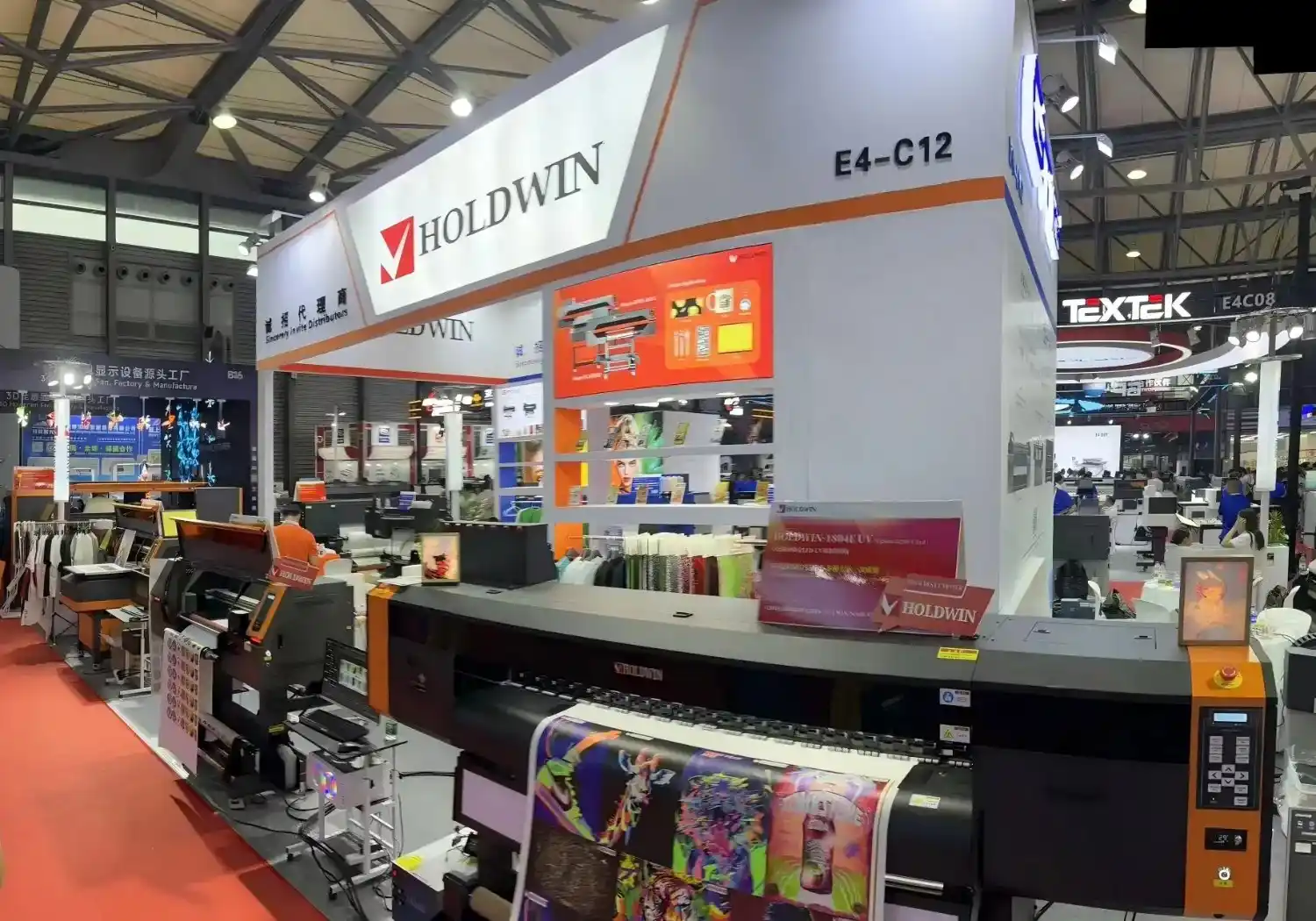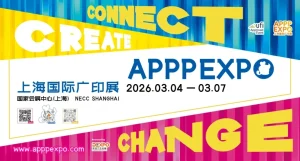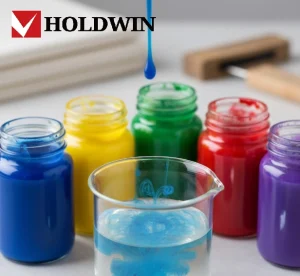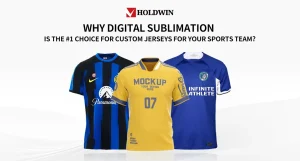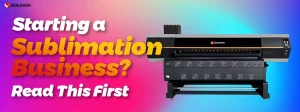Direct to Film (DTF) printing is a way to decorate apparel by transferring designs directly onto fabric instead of using traditional methods like screen printing or embroidery. This process starts with printing the design onto a film using water-based pigment inks that even include white ink for better coverage. Next comes the application of a melt adhesive powder over the printed design, which is then heated to cure it. After curing the film, heat treatment ensures that when pressed onto the fabric using a heat press machine results in the design sticks well and lasts long.
DTF printers such as the HOLDWIN DTF604I+Df 800S come with sophisticated functionalities like adjustable pinch rollers at three levels and smooth guide rails for silent operation along with precise platforms, for accurate and effective printing procedures in place. Utilizing CMYK+W paint ink guarantees hues and firm attachment to different materials used in printing applications.
What Sets DTF Printing Apart from Traditional Methods?
DTF printing is known for its adaptability and effectiveness in comparison to techniques such as screen printing or sublimation process as it does not necessitate elaborate preparations or particular fabric varieties for execution purposes and can function on diverse materials like cotton blends and leather accessories along with non traditional surfaces, like ceramics while also removing the necessity of treating garments beforehand.
The HOLDWIN 620 Pro UV Hybrid Printer showcases its versatility through its capability for printing with COLOR+W+W that sticks to the surfaces of almost all products, making it perfect for producing custom designs with elaborate details and vivid hues.
What Are the Key Advantages of DTF Printing for Your Business?
DTF printing comes with benefits that make it an appealing choice for companies operating in the apparel sector.
- Cost-Effectiveness: It reduces production costs by eliminating screens and plates required in traditional methods.
- Versatility: DTF printers can print on diverse materials such as plastic, metal, glass, timber, ceramics, and leather.
- Durability: Designs created using DTF are highly durable, resistant to daily wear and tear, scratching, water exposure, and sunlight.
- Customization: The technology supports high-end customization options like bronzing and hot silver effects.
- Eco-Friendly: Water-based inks used in DTF are less harmful to the environment compared to solvent-based inks.
How Can DTF Printers Enhance Efficiency and Productivity?
Contemporary DTF printers aim to enhance production efficiency without compromising the quality of the outputs.
- High-Speed Printing: For instance, the HOLDWIN-DTF605I+DF800L(A)pro achieves speeds of up to 34㎡/h at 6-pass settings.
- Automatic Features: Features like automatic feeding systems and ink deficiency alarms minimize manual intervention.
- Precision Engineering: Silent guide rails and high-precision platforms ensure consistent results without errors.
- Scalability: Coil printing capabilities allow for large-scale production of personalized designs efficiently.
How Do Print Quality and Durability Impact Your Output?
Quality printing is essential for keeping customers happy and upholding a brands image intact as vibrant colors and high resolution bring designs to life on clothing items while lasting durability ensures that these prints remain vivid after multiple washes and exposure, to various environmental conditions.
The HOLDWIN series of high quality printers make use of cutting edge print heads like the Epson i3200 Ul or F1080× 12 for detail and color accuracy in printing tasks.The incorporation of scratch coatings also boosts the durability of printed patterns and designs.
Why Is Ease of Use an Essential Factor in Choosing a Printer?
Efficiency is closely tied to user friendliness as it cuts down on training hours for staff and decreases mistakes made when in use.
- User-Friendly Interfaces: Intuitive controls simplify complex tasks.
- Automated Systems: Features such as automatic white ink mixing systems prevent clogging issues commonly associated with white ink usage.
- Compact Design: Space-efficient models like the HOLDWIN-302F+DF300S make them suitable for small workshops.
- Maintenance Support: Nozzle clog remedies and silent operation features reduce downtime.
When businesses carefully consider these factors while choosing a DTF printer they can enhance their workflow efficiency.
What Types of Fabrics Work Best with This Technology?
DTF printers are well known for their versatility in handling fabrics and materials – a stark contrast to conventional printing approaches that are constrained by fabric restrictions. DTF technology stands out for its adaptability; it can print effortlessly onto cotton blends as well as polyester and leather fabrics, and even ceramics too. This makes it a favored option, for businesses serving customer demands. By utilizing paint ink in CMYK+W format, DTF printers deliver hues and superb adhesion qualities across these varied materials.
The HOLDWIN 620 Pro UV Hybrid Printer offers printing with COLOR+W feature that can adhere to nearly all product surfaces. From tough materials like plastic and metal to delicate ones like glass and leather. Making it a versatile option, for producing top notch designs on various substrates.
How Does Versatility Play a Role in Expanding Business Opportunities?
DTF printers offer businesses opportunities by allowing them to serve a wide range of industries beyond just clothing customization options. One example is the HOLDWIN DTF604I+DF800, which is perfect for creating products, like garments ,hat’s, sneakers, pillows, tote bags, and aprons, including reflective safety vests. This flexibility empowers businesses to broaden their product range and reach customer segments.
Furthermore, the capacity to produce patterns with lively hues and long-lasting coatings increases the attractiveness of bespoke items. Characteristics such as bronzing and silver embellishments also enhance the excellence of merchandise, rendering them appropriate for premium customization. Through utilizing these functionalities, companies can draw in a clientele and position themselves as front runners in tailored product fabrication.
How Can You Ensure Optimal Performance from Your DTF Printer?
It’s important to maintain DTF printers to keep them working well for a long time and at their best performance level. Operators often encounter nozzle clogging issues when using ink with these printers. To tackle this problem effectively and efficiently in todays DTF printers like the HOLDWIN 302F+DF300S model manufacturers have included features such, as nozzle clog remedy functions and automatic white ink mixing systems. These functions help prevent clogs by moving the ink and ensuring its consistency.
Regularly cleaning the printheads is crucial for maintaining performance levels of the printer equipment units users operate with approved cleaning solutions provided by the manufacturer to eliminate any remnants or dried ink that might impact the quality of prints produced during operations. Additionally ensuring that components such, as pinch rollers are regularly inspected and adjusted guarantees accurate material handling processes throughout printing tasks.
FAQ
Uneven powder distribution during adhesive coating is a frequent challenge. Advanced solutions like the DF300s shaking powder machine with extended drying tunnels ensure consistent application across the entire design area, improving both bond strength and product durability.
DTF printers perform best in stable conditions (18-30°C temperature and 40-60% humidity). Deviations can cause ink drying problems or poor adhesion. We recommend using climate control systems to maintain optimal printing conditions.
Many modern DTF printers like HOLDWIN models feature low-ink warning systems that alert operators before ink runs out. This proactive approach helps maintain continuous production without unexpected stoppages.

